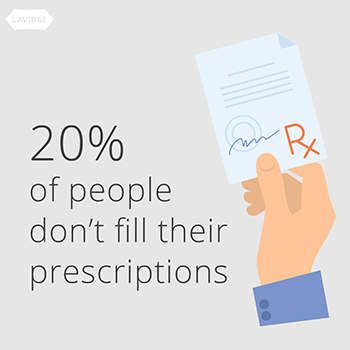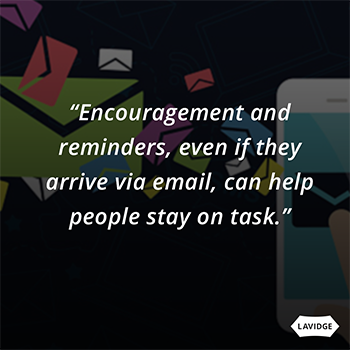Sign up for our LAVY email
and get our bi-monthly newsletter.
Are healthcare marketers ignoring best practices?
From a marketing automation perspective, it certainly seems so. Where other industries have been enthusiastic early adopters of digital content and automating customer contact, healthcare has consistently lagged behind.
When was the last time you received content-rich information from your doctor as a follow-up to your office visit? After a visit to the emergency room, did you hear from the hospital at regular intervals to check on your health? How often has your insurance plan sent you anything via email other than cryptic explanations of benefits?
If you answered hardly ever to these questions, we’re not surprised. Healthcare employs digital technology to reach out to customers, but such contact is almost entirely restricted to appointment reminders or unpaid bills.
Marketing automation is sometimes thought to be best for nurturing leads and customer acquisition. But the nature of the practice—sending regularly scheduled valuable content to a well-defined group of people—is excellent for staying in contact with current customers. For healthcare, that means talking with patients and members of health plans in order to drive specific behaviors.
We understand healthcare’s reluctance to embrace marketing automation. A survey of healthcare IT professionals by the Content Marketing Institute and MarketingProfs tells the story:
Marketing automation offers a tremendous opportunity to improve healthcare outcomes. It’s not as if the healthcare industry isn’t incentivized to find ways to help people feel better. The U.S. government now docks a hospital’s Medicare reimbursement if a patient returns to the hospital within 30 days of being discharged.
 Here are some sobering statistics. More than half of Americans don’t take their prescription medications as instructed. And 20% of people don’t fill their prescriptions. Worse yet, prescription compliance is lowest among people with chronic illnesses.1
Here are some sobering statistics. More than half of Americans don’t take their prescription medications as instructed. And 20% of people don’t fill their prescriptions. Worse yet, prescription compliance is lowest among people with chronic illnesses.1
What’s going on? The answer: Something that might be improved with marketing automation.
Here’s the problem. You hurt your knee in a weekend warrior accident and head to a hospital, physician or orthopedic specialist. They fix you up and send you home with several prescriptions and a stack of papers with step-by-step instructions for rehabbing your knee over a period of several weeks. The documents include immediate care instructions, a how-to guide for heat/icing treatments, and ongoing stretching. But the papers are left in the backseat of the car or end up in a stack under unopened bills. You forget to fill your prescriptions. There’s no one to make sure you perform your daily exercise regimen.
 Sound familiar?
Sound familiar? Now, imagine that the afternoon after arriving home from your appointment you receive an email from your doctor or clinic thanking you for choosing them and providing a summary of your after-care instructions and next steps. And then, how would you feel if the next day another email reminded you to fill your prescription? How likely would you to be to keep up with your rehab if you received regular emails that followed up on your icing treatments, your exercises and provided “tips of the week”?
This is the concept behind healthcare automation—creating an automated digital relationship that transcends brick and mortar.
The benefits of such a program are impressive.
Consistency: Condition and ailment protocols can be formalized with content presented in a manner that doesn’t rely on office staff execution.
Long-Term Health Management: Encouragement and reminders, even if they arrive via email, can help people stay on task, take their medicine, and follow complex multi-week instructions.
Building Relationships: The patient/doctor relationship isn’t helped when it’s only supported by appointment reminders. Messages tied to care will show that your facility or health insurance plan genuinely cares.
Reduced Recidivism: An effective marketing automation program will ensure that people follow instructions, fill their prescriptions and generally stay with the plan. That’s certain to increase successful healing, and that decreases the odds of the patient having a relapse that requires treatment.
Alleviate paperwork: Instead of physician assistants or office staff having to gather paper copies of treatment regimens, all the content can be stored digitally and delivered via email on a specified schedule to customers.
Wellness: This is one of the big payoffs afforded by marketing automation. After a patient is successfully treated for their medical condition, imagine communicating with them on a regular basis about topics that will ensure they stay healthy. Content related to nutrition and exercise will be embraced.
Referrals: True, the big advantage is helping people get better. But another benefit is ensuring patients are entirely satisfied and amazed. That will create raving fans and brand ambassadors.
Competitive Edge: Marketing-automation best practices are not prevalent within healthcare. So those that jump on the digital customer relationship bandwagon can reap the rewards before others catch on.
It is certainly true that age is related to accessing healthcare. You might think that seniors don’t access the internet or email, which would present a barrier to effective marketing automation. But that technology gap for seniors is quickly fading. According to a report by Pew Research Center, while it is true that older adults have lagged behind internet adoption, “the clear majority (58%) of senior citizens use the internet.” And while they are online less frequently than younger consumers, older adults are now adopting and using the internet at the fastest rate.
Effective marketing automation isn’t easy, especially when most currently installed healthcare and patient management systems don’t offer or integrate with marketing automation. Whether it’s installing new software platforms or temporary middle-ware shortcuts, your marketing agency should be your technology partner and provide the best resources to get you started.
Not sure where to start? No problem. LAVIDGE experts in marketing automation for the healthcare industry can point the way.
To learn more, give us a call at 480.998.2600 or send email to info@lavidge.com.
Here are five questions to help determine if a marketing automation program might be good for your hospital, physician clinic or health insurance plan.
Do you know whether or not your patients are filling their prescriptions or taking all their medications?
Do you presently follow up with your patients on a consistent basis to ensure they are following instructions?
Do you provide healthy patients or plan members with ongoing wellness information to help keep them healthy?
How much time does it take your staff to print, photocopy or prepare instructional materials provided to customers?
Do you have a patient portal that goes mostly unused by your patients?
Sign up for our LAVY email
and get our bi-monthly newsletter.